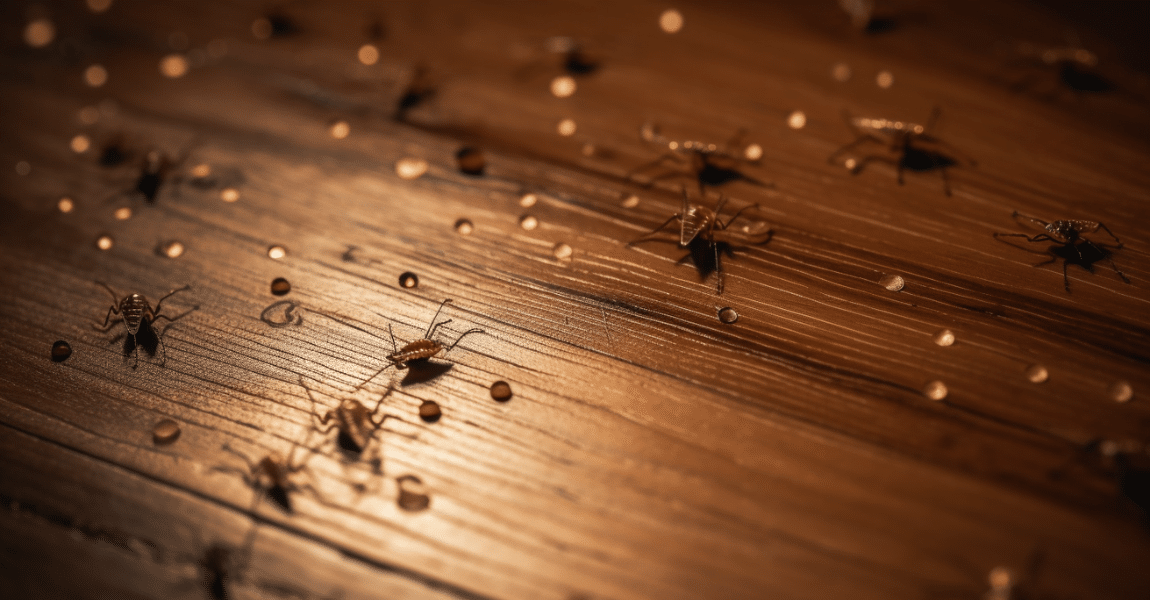Are you struggling with a flea infestation on your hardwood floors? These pesky parasites can be a nightmare to deal with, causing discomfort and irritation for both you and your pets.
Fortunately, there are several effective methods for getting rid of fleas on hardwood floors, allowing you to restore a clean and comfortable living space.
Before you begin treatment, it’s important to identify the source of the infestation. Fleas can hitch a ride into your home on your pets, clothing, or even furniture, so it’s essential to pinpoint the root cause in order to prevent future outbreaks.
Once you’ve identified the source, you can begin preparing your floors for treatment, using natural cleaning solutions and deep cleaning methods to eliminate fleas and keep them at bay.
By following these simple steps, you can finally get rid of fleas on your hardwood floors and enjoy a clean, pest-free home.
Identifying the Source of the Flea Infestation
If you’re constantly scratching your ankles and finding tiny jumping creatures, it’s time to figure out where those pesky fleas are coming from! Identifying the source of the flea infestation is crucial in getting rid of them.
Fleas can come from a variety of sources, including pets, wild animals, and even humans. It’s important to identify the source so that you can take the necessary steps to eliminate the fleas.
The first step in identifying the source of the flea infestation is to check your pets for fleas. If your pet has fleas, it’s likely that they’re the source of the infestation. You’ll need to treat your pet with flea medication and wash their bedding and any other items they come into contact with.
If your pet is not the source of the fleas, you’ll need to look for other sources. Wild animals, such as raccoons and squirrels, can also be a source of fleas. If you have a bird feeder or other food source outside, it may be attracting these animals to your home. You can try removing the food source and making sure any openings in your home are sealed to prevent these animals from entering.
If you’re still having trouble, you may need to call in professional pest control services to help eliminate the fleas. Identifying the source of the flea infestation is the first step in getting rid of them. Whether it’s your pet, wild animals, or something else, it’s important to take the necessary steps to eliminate the fleas.
Flea extermination methods can be effective, but if you’re having trouble, don’t hesitate to call in the professionals. With a little effort, you can rid your home of these pesky pests and enjoy a flea-free environment.
Preparing Your Hardwood Floors for Treatment
Prior to administering treatment, it’s important to properly prepare your hardwood flooring. This involves sanding and refinishing the hardwood floors to remove any cracks, crevices, or dents where fleas might hide.
Sanding and refinishing the floors will not only make them look new, but it’ll also remove any traces of dirt, dust, and pet hair that could be harboring fleas.
After sanding and refinishing, the next step is to seal and waterproof the hardwood floors. This is an essential step in making sure that the flea infestation doesn’t reoccur.
Sealing the floors will prevent any moisture from seeping into the wood, which could attract fleas. It’ll also make it easier to clean the floors, which will help to prevent the buildup of dirt and debris.
Once the floors have been properly sealed and waterproofed, you can begin treating the fleas. There are a variety of methods that you can use, including vacuuming, using flea sprays and powders, and hiring a professional exterminator.
Regardless of the method you choose, it’s important to continue to maintain your hardwood floors by regularly cleaning and vacuuming to prevent future flea infestations.
Using Natural Cleaning Solutions to Repel Fleas
One effective way to keep fleas away from your hardwood floors is by using natural cleaning solutions. These solutions not only repel fleas but also protect the wood from damage.
One DIY flea repellent that you can use is a solution of equal parts water and white vinegar. This solution not only repels fleas but also disinfects the hardwood floors.
Another natural cleaning solution that is effective in repelling fleas is the use of essential oils. Essential oils have been known to repel fleas and other insects due to their strong scent. Some of the essential oils that are effective in repelling fleas include lavender, peppermint, and eucalyptus.
To use essential oils, mix a few drops with water and spray on the hardwood floors.
Natural cleaning solutions such as DIY flea repellent and essential oils are effective in repelling fleas from your hardwood floors. These solutions not only repel fleas but also protect the wood from damage.
It’s important to note that while these solutions are effective, they may not completely eliminate the flea infestation. Therefore, it’s important to seek professional help if the flea infestation persists.
Vacuuming and Deep Cleaning Your Hardwood Floors
Regularly cleaning and maintaining your hardwood floors is crucial in keeping your home free from pests and maintaining the beauty of your floors.
When it comes to vacuuming, it’s important to choose the right vacuum for the job. Look for a vacuum that has powerful suction and a hard floor setting to ensure that it picks up all the dirt and debris on your hardwood floors. Avoid using vacuums with beater bars, as they can scratch and damage your floors.
In addition to vacuuming, deep cleaning your hardwood floors is also important in getting rid of fleas. Steam cleaning is one effective method for deep cleaning. This method involves using a steam cleaner to kill fleas and their eggs, as well as removing dirt and grime from your floors. When steam cleaning, it’s important to follow the manufacturer’s instructions and use the appropriate cleaning solution for your flooring type.
Remember to also regularly clean and disinfect your vacuum and steam cleaner to prevent the spread of pests and bacteria.
By vacuuming and deep cleaning your hardwood floors, you can effectively eliminate fleas and other pests from your home while keeping your floors looking their best.
Preventing Future Flea Infestations on Your Hardwood Floors
To keep your home free from fleas, it’s crucial to prevent reinfestation. One way to do this is by using flea control products. These products come in various forms, such as sprays, powders, and foggers. They contain insecticides that kill fleas and their larvae, preventing them from reproducing and infesting your home again.
When using flea control products, it’s essential to follow the instructions carefully. Make sure to use the appropriate amount and apply them in the right areas. Some products may not be suitable for hardwood floors, so check the label before using them. Additionally, keep children and pets away from treated areas until the product has dried completely.
Apart from using flea control products, you can also prevent reinfestation by keeping your home clean. Regularly vacuuming your hardwood floors and furniture can help remove fleas and their eggs. Wash your pet’s bedding, toys, and other items that may be infested with fleas.
Also, keep your lawn well-maintained by trimming the grass and removing any debris that may harbor fleas. By taking these steps, you can keep your home flea-free and enjoy a pest-free environment.
Frequently Asked Questions
Can fleas survive on hardwood floors without a host?
Fleas can survive on hardwood floors for a few days without a host, but they prefer living on a host. Prevention techniques for flea infestations on hardwood floors include vacuuming regularly, using flea-repelling products, and washing pet bedding frequently.
How long does it take for fleas to die after treatment?
After flea treatment, it takes around 24-48 hours for adult fleas to die. Larvae and eggs may take longer to eradicate, up to several weeks. Flea eradication timeline depends on the effectiveness of the treatment and the severity of the infestation.
Are there any natural remedies for flea bites on humans?
To alleviate flea bites on humans, try natural remedies like aloe vera, tea tree oil, or apple cider vinegar. For prevention, regularly vacuum carpets and wash bedding in hot water.
Can flea infestations on hardwood floors affect pets living in the house?
Flea infestations on hardwood floors can affect pet health. Implement flea prevention strategies such as regular vacuuming and treating pets with flea medication. Consult with a veterinarian for additional advice.
Are there any long-term health effects of flea infestations on humans or pets?
Long-term effects of flea infestations on humans and pets include allergic reactions, anemia, and transmission of diseases. Prevention strategies include regular vacuuming, proper pet grooming, and professional pest control services.
Conclusion
In conclusion, getting rid of fleas on hardwood floors requires a multi-step approach. It involves identifying the source of the infestation, preparing your floors for treatment, using natural cleaning solutions to repel fleas, vacuuming and deep cleaning your floors, and taking preventive measures to avoid future infestations.
By following these steps, you can effectively eliminate fleas from your hardwood floors and keep them at bay in the long run. Remember to start by identifying the source of the infestation and treating any pets or areas where the fleas may be hiding. Then, prepare your floors for treatment by removing any clutter or obstacles and vacuuming thoroughly.
Use natural cleaning solutions like vinegar or essential oils to repel fleas, and deep clean your floors with a steam mop or hardwood floor cleaner. Finally, take preventive measures like regularly vacuuming and washing your pets’ bedding to avoid future infestations.
With these steps, you can enjoy a flea-free home and keep your hardwood floors looking their best.


